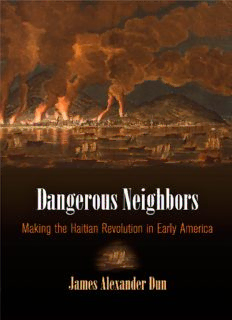
Dangerous Neighbors: Making the Haitian Revolution in Early America PDF
Preview Dangerous Neighbors: Making the Haitian Revolution in Early America
Dangerous Neighbors EARLY AMERICAN STUDIES Series editors: Daniel K. Richter, Kathleen M. Brown, Max Cavitch, and David Waldstreicher Exploring neglected aspects of our colonial, revolutionary, and early national history and culture, Early American Studies reinterprets familiar themes and events in fresh ways. Inter- disciplinary in character, and with a special emphasis on the period from about 1600 to 1850, the series is published in partnership with the McNeil Center for Early American Studies. Dangerous Neighbors k Making the Haitian Revolution in Early America James Alexander Dun UNIVERSITY OF PENNSYLVANIA PRESS Philadelphia Copyright © 2016 University of Pennsylvania Press All rights reserved. Except for brief quotations used for purposes of review or scholarly citation, none of this book may be reproduced in any form by any means without written permission from the publisher. Published by University of Pennsylvania Press Philadelphia, Pennsylvania 19104-4112 www.upenn.edu/pennpress Printed in the United States of America on acid-free paper 10 9 8 7 6 5 4 3 2 1 ACataloging-in-Publication record is available from the Library of Congress ISBN 978-0-8122-4831-9 For Kelly In memory of our daughter, Josephine Ann Dun k This page intentionally left blank Contents k Introduction Making Revolution in Philadelphia 1 Chapter 1 France in Miniature: Naming the Revolution 27 Chapter 2 Unthinking Revolution: French Negroes and Liberty 56 Chapter 3 The Negrophile Republic: Emancipation and Revolution 87 Chapter 4 Making Places of Liberty: Emancipation and Antislavery 121 viii Contents Chapter 5 Black Jacobins: Saint Domingue in American Politics 143 Chapter 6 Second Revolutions: Saint Domingue and Jeffersonian America 179 Chapter 7 Naming Hayti: The End of the Revolution in Philadelphia 209 List of Abbreviations 239 Notes 241 Selected Bibliography 321 Index 331 Acknowledgments 339 Introduction k Making Revolution in Philadelphia Late in the morning of July 7, 1794, Friar José Vázquez arrived at the town of Fort Dauphin. Though he could not know it at the time, he came telling stories of the Haitian Revolution. Perched on the northern coast of French Saint Domingue, Fort Dauphin sat close to the border with Spanish Santo Do- mingo. Vázquez, in fact, came from the Spanish colony, from the interior town of Dajabón where he was a priest. What made his arrival noteworthy, however, was less his spiritual authority than his earthly influence. Insurgent ex-slaves had controlled the area since late 1791, and Vázquez was known to be an advi- sor to one of their leaders, Jean-François. After Spain and France declared war in 1793, the priest had become an intermediary between the insurgents and Spanish authorities. In spring 1793 Jean-François had been made a general and his troops declared auxiliaries of the Spanish army. Relying on these forces, Spain had nominally taken control of wide swaths of Saint Domingue’s North and West provinces. In January 1794 they secured Fort Dauphin, known to the Spanish as Bayajá, and began to mass Spanish and black troops in preparation for an attack against the French republican forces at Cap Français.1 For the anxious inhabitants of Fort Dauphin, Friar Vázquez seemed like a safe source of information as they tried to make sense of this shifting ground. Many of them were planters, white French colonists of a royalist bent who hoped the fight against the Republic would ultimately bring stability back to the region, even if it also put the colony under foreign control. A sizable number among them had recently returned from the United States, having fled there during earlier moments of tumult in the colony. In American cities they had read an invitation addressed to all who opposed the “anarchy” of the French
Description: